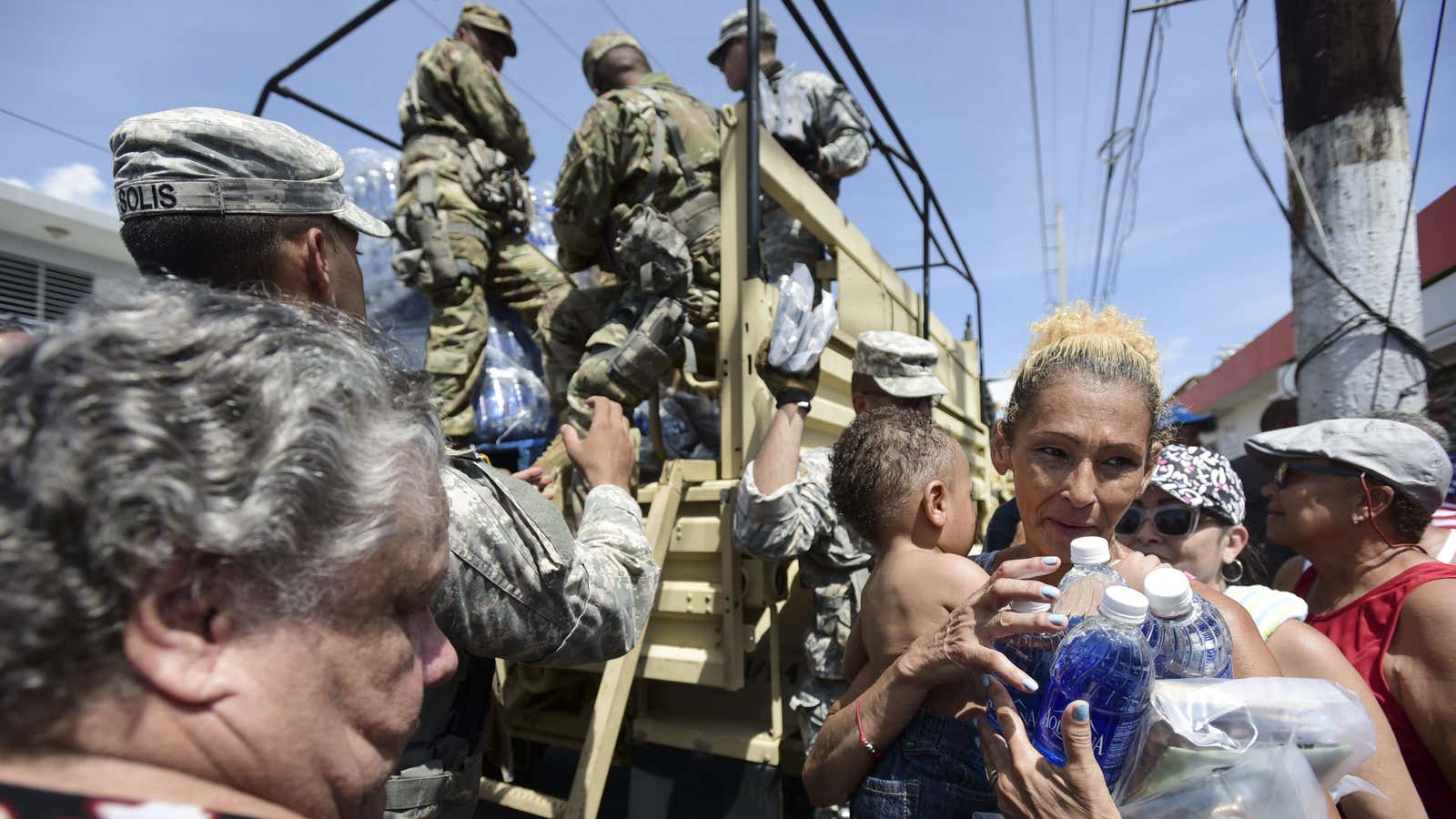In the aftermath of hurricane Maria, Puerto Rico is dealing with horrifying devastation. One thing that could help with a recovery that’s bound to be long and difficult is opening the ports to emergency-supply-laden foreign boats. Plenty such boats come and go to the US that could be deployed for that task, but there’s a catch: They’re not allowed to unload their wares on the island.
Under a long-standing US law, the 1920 Merchant Marine Act, all the transportation of goods between US ports has to be done by US vessels exclusively. This means that ships from other countries can’t transport supplies between US harbors. That limits the number of available boats, even in unusual, extreme situations such as what Puerto Rico is experiencing now.
In the wake of past natural disasters, the US has temporarily lifted the rule, known as the Jones Act after its sponsor, senator Wesley Jones. The Department of Homeland Security did that earlier this month in response to hurricanes Harvey and Irma, which hammered the Gulf and Atlantic Coasts.
But the federal agency has kept the Jones Act in place after Maria hit Puerto Rico, despite pleas by several Puerto Rican members of Congress. A group of lawmakers is asking Homeland Security, the agency that oversees the rule, to waive it for a year. ”Temporarily loosening these requirements—for the express purpose of disaster recovery—will allow Puerto Rico to have more access to the oil needed for its power plants, food, medicines, clothing, and building supplies,” they wrote in a letter to Homeland Security acting secretary Elaine Duke.
The agency says the situation in Puerto Rico after Maria is different than that of regions on the mainland after Harvey and Irma, since those hurricanes put some high-capacity fuel pipelines out of commission. Boats were therefore needed to move those supplies, it said.
The agency’s assessment is that there are sufficient boats to serve Puerto Rico. “The limitation is going to be port capacity to offload and transfer cargo, not vessel availability,” it said in a statement.
Indeed, some gridlock has already emerged in Puerto Rico: Containers are piling up at ports as goods arrive faster than trucks can haul them away, according to local reports. But longer term, increasing the supply of delivery boats would help Puerto Rico, which was already in dire straits before the arrival of Maria.
The island has been stuck in a downward economic spiral for years. Its weakened economy is overly dependent on imports; for example, they account for more than 80% of its food supplies. Those and other goods are mostly delivered by just three US transportation companies. The result, according to a government-commissioned report by former International Monetary Fund economists: Puerto Rico pays twice as much for imports from the US as neighboring US Virgin Island, which is exempted from the Jones Act.
The Homeland Security Department says under law, it can only waive the Jones Act for purposes of national security, and that the potential cost savings of lifting the law “is not material to our decision-making.”
Under the Act, for a ship to be allowed cabotage, or transportation of goods and people between two harbors in the same country, it has to satisfy all three of these conditions: be US built, US owned, and US-flag-carrying (which means the ship is registered as American). The law’s original intent was to fortify the US ship building industry after World War I. Nearly 100 years later, that goal is no longer realistic. Only five large shipyards survive in the country, and the number of American-built vessels has shrunk dramatically: between 2006 and 2011, the US-built, owned, and operated fleet shrank 17%, according to a study by the Grassroot Institute of Hawaii. That means there’s only so many boats that meet all three conditions available to deliver goods in Puerto Rico.
Some locals have long argued for the permanent suspension of the Jones Act, saying it’s crippling Puerto Rico’s economy. The fact that the US is refusing to lift it even temporarily in the midst of a major emergency does not bode well for their cause.
